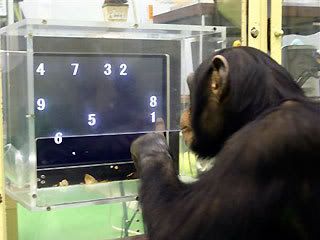by
Charles Q. Choi
Read Here the scientific research article by Sana Inoue and Tetsuro Matsuzawa in CURRENT BIOLOGY, "Working Memory of Numerals in Chimpanzees" Primate Research Institute, Kyoto University, Inuyama, Aichi 484-8506, Japan
Watch the video clip (click here): Video: Chimps Do Numbers

A chimpanzee named Ayumu as he begins a memory test
with nine numerals placed in various positions on a touchscreen.
(Photo courtesy AP/Primate Research Institute )
Young chimps apparently have an extraordinary ability to remember numerals, and recall them even better than human adults do.
A sharp memory could prove useful to chimps in the wild.
Although researchers have extensively studied chimpanzee memory in the past, the general assumption has been that it is inferior to that of humans, as with many other mental functions.
Researcher Tetsuro Matsuzawa, director of the Primate Research Institute of Kyoto University in Japan said,
"There are still many people, including many biologists, who believe that humans are superior to chimpanzees in all cognitive functions. No one can imagine that chimpanzees — young chimpanzees at the age of 5 — have a better performance in a memory task than humans.
(This) shows for the first time that young chimpanzees have an extraordinary working memory capability for numerical recollection — better than that of human adults tested in the same apparatus, following the same procedure.
Young chimpanzees are superior to human adults in the immediate memory of details.
Suppose that a group of males met an adjacent group in the patrol of the territory. It is important to know how many enemies and where [they are] in the bush at a glance.Suppose that a chimpanzee arrived at a huge fig tree. It is important to know where the red ripe fruits are, against green ones. It is also important to know the positions of top-ranking males. You cannot eat fruits near the high-ranking males."
The scientists tested three pairs of mother and infant chimpanzees against NINE UNIVERSITY students in a memory task involving numerals.
All of the chimps had already learned the ascending order of Arabic numerals, from 1 to 9.
The chimpanzees and humans were each briefly shown four to nine numerals at a time scattered across a touchscreen. Those numbers were then all simultaneously replaced with blank squares.
The volunteers then had to recall which numeral appeared in which place and touch the squares in ascending order, from lowest to highest. The chimps were rewarded with raisins or apple cubes for correct answers.
The scientists unsurprisingly found that people got worse the less time the numerals spent onscreen.
However, they discovered the three young chimps could remember many numerals with a glance, with virtually no change in performance even when the numbers were flashed for just 210 milliseconds — roughly twice as long as a blink of an eye and not enough time for human vision to wander across a screen.
In general, the young chimps performed better than their mothers and adult humans.
Matsuzawa said the young chimps' ability resembled photographic memory, the ability in humans to retain a detailed and accurate picture of a complex scene or pattern. This talent—also known as eidetic imagery—is also known to decline with age, as it seems to do in chimps.
This talent — also known as eidetic imagery — is also known to decline with age in humans, as it seems to do in chimps.
As to why chimpanzees—humanity's closest living relatives—have such a strong talent compared to most humans, Matsuzawa speculated there was an evolutionary tradeoff between this kind of sharp memory and the higher mental functions seen in humans, such as our advanced capability for language.
"It's amazing what this chimpanzee is able to do," Elizabeth Lonsdorf, director of the Lester E. Fisher Center for the Study and Conservation of Apes at the Lincoln Park Zoo in Chicago, told the Associated Press. The center studies the mental abilities of apes, but Lonsdorf didn't participate in the new study.
She admired Ayumu's performance when the numbers flashed only briefly on the screen.
"I just watched the video of that and I can tell you right now, there's no way I can do it," she said. "It's unbelievable. I can't even get the first two [squares]."
The research by Matsuzawa and his colleague Sana Inoue is detailed in the Dec. 4 issue of the journal Current Biology.


No comments:
Post a Comment